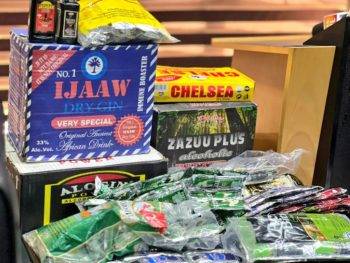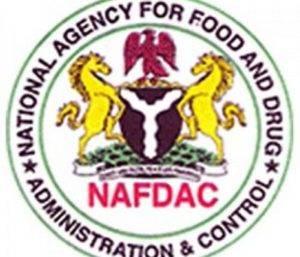Threatening Half a Million Jobs
NAFDAC (National Administration Food Drug And Control) faced huge protest by Nigerian workers, represented by the Food Beverage and Tobacco Senior Staff Association and the National Union of Food Beverages, against the recent ban on sachet alcoholic drinks imposed by the National Agency for Food and Drug Administration and Control (NAFDAC). The demonstration, which gathered hundreds of workers, primarily from the affected industries, voiced concerns over the severe impact the ban would have on employment and the economy at large.
The protesters, brandishing placards bearing messages such as ‘NAFDAC, Our Jobs Are on the Line’ and ‘All We Need is Good Regulation, Not Total Ban’, expressed vehement opposition to the decision, arguing that it would exacerbate the already dire unemployment situation in Nigeria. The ban, they contended, threatens the livelihoods of approximately 500,000 Nigerians who are directly or indirectly employed in the production, distribution, and sale of sachet alcoholic beverages.
The rally commenced beneath the Iyana-Isolo Bridge and proceeded through adjacent streets, resonating with chants of solidarity. Upon reaching the NAFDAC office, where their leaders addressed the public and media representatives, the demonstrators implored the agency to reconsider its stance, emphasizing the adverse economic ramifications. They urged NAFDAC to explore alternative measures, such as enhanced regulation and quality control, rather than an outright prohibition, to safeguard both industry interests and public health.

Workers Warn Against Unintended Consequences
Central to the workers’ grievances is the concern that NAFDAC’s ban on sachet alcoholic beverages, intended to curb alcohol abuse and promote public health, may inadvertently exacerbate existing challenges. Emmanuel Idogien, Vice Chairman of the Lagos Council of NUFBTE, highlighted the potential ripple effects of the policy, asserting that its implementation without careful consideration of its broader implications could inflict severe damage on families and the economy.
Moreover, the protesters underscored the risk of driving consumers towards illicit alternatives in the absence of regulated options, thereby fueling the proliferation of counterfeit products. This, they argued, not only undermines public health and safety but also undermines the efforts of legitimate industry players to adhere to quality standards and regulatory compliance. As such, they urged NAFDAC to adopt a more nuanced approach that balances public health objectives with the preservation of livelihoods and economic stability.
Calls for Dialogue and Collaborative Solutions
In the aftermath of the protest, stakeholders, including representatives from both the affected industries and regulatory authorities, are urged to engage in constructive dialogue to address the underlying concerns comprehensively. Workers emphasize the importance of a collaborative approach that solicits input from all relevant parties to formulate policies that are effective, equitable, and sustainable in the long term.

Amidst mounting pressure and growing dissent, the onus lies on NAFDAC and other regulatory bodies to heed the voices of the affected workers and strive for a balanced regulatory framework that upholds public health objectives while mitigating adverse socio-economic consequences. Failure to do so risks exacerbating tensions and perpetuating a cycle of discord that undermines the collective interests of all stakeholders involved.
NAFDAC Faces Criticism Over Licensing of Alcohol Production
The National Agency for Food and Drug Administration and Control (NAFDAC) finds itself under scrutiny following revelations of the ease of producing counterfeit alcohol products in Nigeria. Concerns have been raised about the negative impacts of alcohol consumption on public health, particularly amidst the backdrop of widespread economic hardship. Critics argue that NAFDAC’s decision to grant licenses for alcohol production without adequately considering potential health implications has exacerbated the issue.
Health Concerns Over Alcohol Consumption
The controversy surrounding NAFDAC’s licensing of alcohol production has reignited discussions about the detrimental effects of alcohol consumption on public health. Despite the agency’s regulatory role, there is growing apprehension regarding the lack of stringent measures to mitigate the risks associated with alcohol abuse. Reports have emerged of alarming trends, including parents administering alcohol to infants as young as six months old and the prevalence of excessive alcohol consumption among young adults. Such practices underscore the urgent need for comprehensive regulations and public awareness campaigns to address the harmful effects of alcohol misuse.

Challenges of Counterfeit Alcohol Production
Moreover, the ease of producing counterfeit alcohol products has raised significant concerns about consumer safety and market integrity. Critics argue that NAFDAC’s oversight failures have created fertile ground for the proliferation of substandard and potentially harmful alcohol products. The prevalence of counterfeit alcohol not only poses serious health risks but also undermines the credibility of legitimate producers. As such, stakeholders are calling for NAFDAC to review its licensing protocols and strengthen enforcement measures to curb the illicit production and distribution of alcohol.
NAFDAC’s decision to grant licenses for alcohol production without adequately considering the negative health implications has sparked controversy and raised questions about its regulatory efficacy. With mounting concerns over alcohol abuse and the proliferation of counterfeit products, there is an urgent need for NAFDAC to reassess its approach to alcohol regulation and prioritize public health and safety. Failure to address these issues comprehensively could exacerbate the already troubling trends of alcohol misuse and counterfeit production in Nigeria.
Table of Contents
Discover more from OGM News NG
Subscribe to get the latest posts sent to your email.














